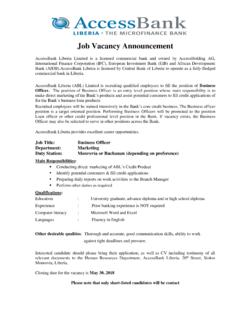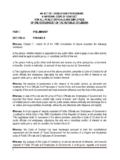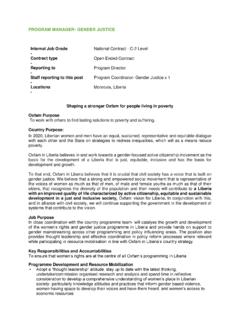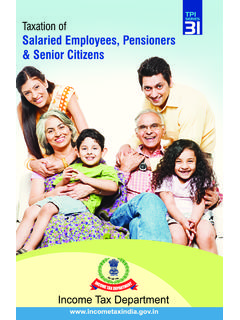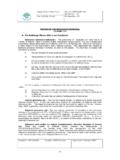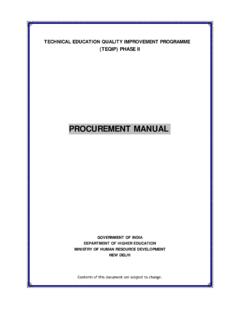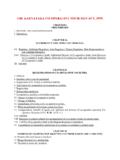Transcription of REPUBLIC OF LIBERIA NATIONAL POLICY ON NON …
1 REPUBLIC OF LIBERIA . NATIONAL POLICY ON. NON-GOVERNMENTAL ORGANIZATIONS. IN LIBERIA . Table of Contents Acronyms 3. Preface 4. Context 5. Background 7. Definition of an NGO 8. Eligibility Requirements for NGO Status 8. Accreditation Requirements for NGOs in LIBERIA 8. Accreditation Procedures 9. Re-accreditation Procedures 10. Formulation and Implementation of Projects 10. Monitoring and Evaluation 11. NGO Assets 11. Capacity Building 11. NGO Council 11. Staffing 11. Taxation 12. Coordination and Institutional Linkages 12. Complaint Resolution Procedures 12. Sector and Thematic Coordination Network 12.
2 Annexes Annex 1 Accreditation Application Form 13. Annex 2 Re-accreditation Application Form 17. Annex 3 Minimum requirements for reporting 21. Annex 4 MPEA Monitoring & Evaluation procedures 22. Annex 5 Labor Law procedural requirements 23. Annex 6 Immigration procedural requirements 26. Annex 7 Taxation and duty waiver procedures 30. Annex 8 List of Sector and Thematic Networks 31. Annex 9 Appeal before Standing Independent Appeal Board 35. 2. Acronyms CBOs Community Based Organizations CSOs Civil Society Organization GOL Government of LIBERIA INGOs International Non Governmental Organizations LINNK LIBERIA NATIONAL NGO Network LNGOs Local Non Government Organizations M&E Monitoring and Evaluation MoF Ministry of Finance MPEA Ministry of Planning and Economic Affairs MSG Management Steering Group NGOs Non Governmental Organizations NNGO NATIONAL Non Government Organizations SSC Sectoral Standing Committee 3.
3 Preface NATIONAL Development Business is a shared responsibility. Non-governmental Organizations (NGOs) have an important role to play in the process. Adequately defining and playing that role during the last twenty years in LIBERIA has been rather difficult task for both NATIONAL and international NGOs. A major contributing factor was the lack of clarity in policies that would provide guidance in NGOs decision-making processes and their field operations. The need to fill this gap became an urgent priority of the Government. This POLICY intends to provide that needed guidance. In real terms, the POLICY prescribes a reasonable set of guidelines aimed at delivering four results: First, they would ensure better coordination among various ministries/agencies involved with the operations of NGOs.
4 Second, the POLICY guidelines would ensure a coherent process for the accreditation of NGOs and the distribution of their programs and activities Third, they would provide a conducive environment for the smooth operations of NGOs and for ensuring stronger accountability and transparency with the NGOs sector. Finally, these guidelines would put in place a systematic approach to the building of requisite capacities and a stronger framework within which both local and international NGOs can work. The provisions contained in this POLICY are in direct response to the various concerns raised during our extensive consultations.
5 Concerns with respect to the working relationship between specific NGOs and local authorities; the impact felt by the ordinary person as a result of the operations of an NGO in a locality; and the proliferation of NGOs and the lack of information on NGO activities. In short, we do hope that these guidelines will better place NGOs contribution within the NATIONAL Development Agenda as the country moves towards our expressed shared NATIONAL vision. On behalf of the Government and the Liberian people, I would like to express my sincere thanks and gratitude to all those in government functions, the United Nations family, the NGO community and consultants- who have contributed to the conceptualization and preparation of this POLICY .
6 Living it out effectively is now the challenge to all of us. These guidelines will come to effect on June 15th 2008. Sincerely, Toga McIntosh Minister of Planning and Economic Affairs 4. Context The role and importance of civil society organizations (CSOs) cannot be over- emphasized as it is part and parcel of the life of its people. Historically, the traditional societies, social clubs, economic clubs (susu), community service and work groups have operated throughout LIBERIA . Later, faith-based organizations emerged and facilitated the transformation and socio-economic development of the country, especially in the areas of education, health and spiritual development.
7 The 70's and 80's saw the emergence of modern day CSOs with a focus on capacity building, human right, advocacy and development issues. The number of these organizations and the magnitude and level of their influence may have warranted the development or formulation of guidelines or POLICY to guide their operations at the time. Their operations in general buttressed government efforts in ensuring peaceful coexistence, stability and NATIONAL development. The war years (1989-2003), shattered the governance structure and systems, the rule of law disappeared and a humanitarian crisis arose that needed immediate attention which no NATIONAL authority could address.
8 The international community had to take the lead in ensuring not only the provision of humanitarian assistance, but also the protection of life and property and eventual return to peace. Non Governmental Organizations (NGOs). became the main instruments through which such support could be provided. The international NGOs, which had the resource base provided the lead. The arrival of international NGOs during this period gave an impulse to the establishment and growth of additional local NGOs. In some cases, they formed partnerships for the delivery of needed humanitarian services to the affected population.
9 The contribution of these organizations to the survival of the affected population and return to peace has been commendable. The proliferation of NGOs in LIBERIA has however brought to light a number of concerns regarding their activities. These concerns have not only been expressed by NGOs themselves but also by governmental authorities and the general public. These concerns are reflected below: The NGOs have expressed the following key concerns: The absence of clear guidelines for NGO operations culminates in complexities in obtaining incorporation and accreditation The lack of decentralized accreditation procedures The propagation of demands from different government institutions for the submission of various reports.
10 Instead of a centralized reporting mechanism The absence of published and transparent fee structures The incidence of corruption on the part of certain public officials The harassment of field workers by local officials The new international aid modalities operates to marginalize NATIONAL NGOs The existence of competition between NATIONAL and international NGOs The inadequacy of capacity building and partnership mechanisms to support NATIONAL NGO programs The inadequacy of government efforts to inform and involve civil society in its development agenda 5. The Government has raised the following key concerns: There is little or no reference and engagement by NGOs with line ministries and local authorities Duty free privileges are abused Some NGOs evade payment of required taxes Some portions of the laws of LIBERIA are compromised or disregarded There is little or no level of sustainability of NGO projects Some NGO projects and programs are not in line with the Government's development agenda While acknowledging the contributions NGOs have made to the country, the public expressed the following key concerns including.

